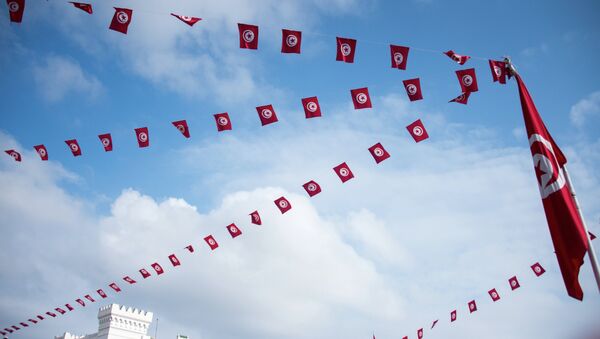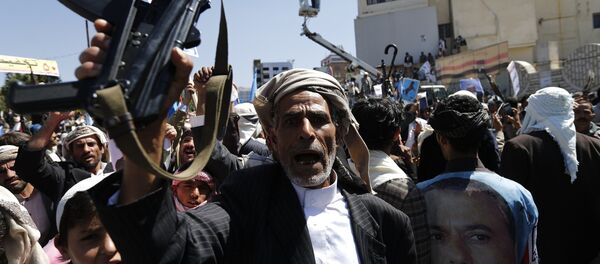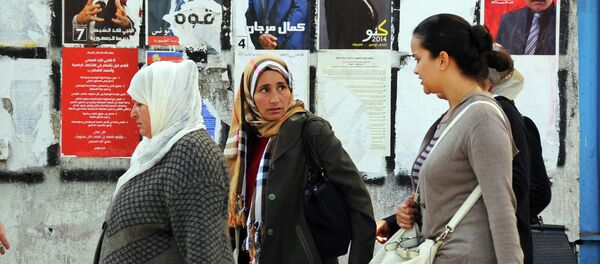The Jasmine Revolution was the first in a string of revolutions, some ongoing, that swept a number of North African and Middle Eastern countries, in what is known collectively as the Arab Spring.
On December 17, 2010, 28-year-old Mohamed "Basboosa" Bouazizi, a fruit and vegetable vendor in Sidi Bouzid, a city in central Tunisia, set himself on fire in front of the city hall to protest his country's deep poverty and the relentless harassment at the hands of a corrupt police force.
Bouazizi's self-immolation was his despairing response to the harassment of Faida Hamdi, a female municipal official, who after slapping and publicly insulting him, confiscated his produce. Hamdi, arrested on the day of the incident, pleaded not guilty, and was eventually acquitted for lack of evidence.
The incident triggered civil unrest in the country, which later led to the Jasmine Revolution, named after the national flower of Tunisia.
On December 24, 2,000 protesters gathered in Menzel Bouzaiane, Bouazizi's home city. In an effort to control the crowd, police used guns, killing two; a curfew was declared and police units blocked all exits from the city.
On January 8, the General Union of Tunisian Workers and other trade union associations sided with the protesters who initially voiced only social slogans. These were later replaced with anti-government and anti-presidential slogans.
On January 10, Tunisian President Zine El Abidine Ben Ali addressed the nation on TV, blaming hostile foreign forces for engineering the riots.
On January 12, military units were deployed in the capital of Tunisia and its suburbs, and a curfew was declared that evening.
On January 14, the president once again spoke on TV announcing the resignation of Prime Minister Mohamed Ghannouchi.
In spite of these gestures popular protests, openly directed against the president, escalated.
A nationwide state of emergency was declared on the afternoon of January 14, as protests continued unabated.
That same day, at 5 pm local time, the president left the country. Media later reported that he had fled to Saudi Arabia.
Mohamed Ghannouchi became the head of state, citing a temporary inability of the president to fulfill his duties.
On January 15, the Tunisian Constitutional Council, acting in accord with the laws of the country's constitution, removed Ben Ali and Ghannouchi from office and appointed Parliamentary Speaker Fuad Mbazza head of state.
Mbazza took his presidential oath of office and instructed Ghannouchi to establish a government of national unity that would represent all major political parties.
On January 17, participants in the Tunisian government of national unity were announced. Defense, Finance, Interior and Foreign Ministers kept their jobs. Opposition leaders, including Ahmed Ibrahim, leader of the Ettajdid (Renewal) Party, and Mustapha Ben Jafar, leader of the Democratic Forum for Labor and Liberties, joined the government. Ahmed Najib Chebbi, leader of the Democratic Progressive Party, was appointed Minister of Regional Development. Ghannouchi said the new government would investigate all those suspected of corruption or enrichment during the rule of Ben Ali.
The new government lifted a ban on opposing political parties and pardoned political prisoners.
On January 18, roughly 1,000 people marched through the streets of Tunis to protest the appointment of members of the former ruling party, the Democratic Constitutional Rally (DCR), to the new government.
The DCR expelled Ben Ali and six other persons. Fuad Mbazza and Ghannouchi became non-party members.
On January 20, all government ministers resigned from the DCR.
Tunisian police officers arrested 33 relatives of the former president for suspected crimes against the country.
On January 23, hundreds of people holding candles spent a night vigil against the new Tunisian government. According to protesters, members of the old government had regained power.
On January 26, Ghannouchi reshuffled his Cabinet and appointed new Interior, Foreign and Defense Ministers. He remained in office, despite numerous protests and calls for resignation.
On February 6, the Interior Ministry suspended the DCR, forbade its members to hold rallies, and shut down all party offices.
On February 25, over 100,000 protesters demanded the resignation of Ghannouchi.
On February 27, Ghannouchi resigned, and Fuad Mbazza appointed Mohamed Beji Caid Essebsi, a former Foreign Minister, to the post of Prime Minister.
In June 2011, a Tunisian court sentenced the former President Ben Ali and his wife Leïla Trabelsi in absentia to 35 years in prison for embezzling state budget allocations.
The court also fined Ben Ali and his wife in absentia 50 million and 21 million Tunisian dinars ($27 million and $11.3 million) respectively.
In early July 2011, a Tunisian court sentenced Ben Ali in absentia to 15.5 years in prison and fined him about $67,000 for illegal possession of weapons and drugs. In late July, he was found guilty of corruption and fraud and sentenced to 16 years.
In June 2012, Ben Ali was sentenced to life in absentia for complicity in the killing of over 300 protesters during the "Jasmine Revolution."
In July, he was once again sentenced to life in absentia for complicity in the killing of 43 protesters during the revolution of 2011.
The events in Tunisia sparked a series of protests in many Arab countries and caused governments to change hands in Egypt, Libya and Yemen. Morocco launched major reforms in the wake of the Tunisian revolution. A bloody conflict flared up between the Syrian government and opposition groups, escalating into an ongoing civil war.
The UN reported that in the Jasmine Revolution 219 people died and 510 were injured. Material losses were estimated at about $2.2 billion.
According to a commission investigating human rights abuses beginning December 17, 2010, about 340 protesters were killed and 2,174 more were injured.
In December 2011, a monument to fruit and vegetable vendor Bouazizi was unveiled in Sidi Bouzid.





